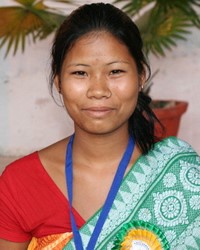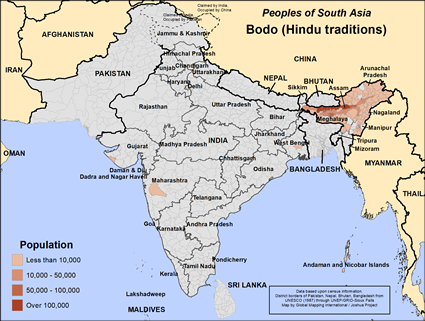Bodo (Hindu traditions) in Bhutan

Photo Source:
Ramesh Lalwani - Flickr
Creative Commons
|

Map Source:
People Group data: Omid. Map geography: UNESCO / GMI. Map Design: Joshua Project.
|
| People Name: | Bodo (Hindu traditions) |
| Country: | Bhutan |
| 10/40 Window: | Yes |
| Population: | 6,700 |
| World Population: | 1,491,700 |
| Primary Language: | Boro (India) |
| Primary Religion: | Hinduism |
| Christian Adherents: | 1.35 % |
| Evangelicals: | 0.00 % |
| Scripture: | Complete Bible |
| Ministry Resources: | Yes |
| Jesus Film: | Yes |
| Audio Recordings: | Yes |
| People Cluster: | South Asia Tribal - other |
| Affinity Bloc: | South Asian Peoples |
| Progress Level: |
|
Introduction / History
The Bodo speak in a Tibeto-Burmese language, and they read and write in Devanagari. The Bodo are a people mostly living in Assam in India, mainly in the north region of the Brahmaputra River Valley. They also live in Bangladesh and Bhutan.
There are many Bodo tribes. At one time they were powerful in India's northeastern state of Assam.
What Are Their Lives Like?
They eat rice and fish and pork. They like to drink rice wine and dance. The Bodo weave and make bamboo items. Many are farmers.
What Are Their Beliefs?
Some of the Bodo follow Brahmoism which is a Hindu reform movement. Some of the Bodo follow Bathouism in which they worship ancestors. They believe that people come from a mixture of sky, earth, air, water and fire. They like to worship near home or in a courtyard. Betel leaves and rice are used for example as offerings. Their most important festival is called Kherai Puja and the altar is put in a rice field. Bathoubwrai is the main deity in Bathouism.
What Are Their Needs?
Like all other peoples of the world, this people group needs the blessings and guidance that only Jesus Christ can offer.
Prayer Points
Pray for the Lord to bless this community economically and spiritually.
Ask God to raise up Bodo people who are more desirous to know the truth than to stay on the broad road.
Ask God to send loving, committed workers to the Bodo in the near future.
Pray the Bodo would no longer be hidden away from the influence of Christ.
Pray for many of them to make disciples who will make even more disciples.